GUI编程
GUI编程
我们要怎么学?
-
是什么,怎么玩,怎么用
组件
-
窗口
-
弹窗
-
面板
-
文本框
-
列表框
-
按钮
-
图片
-
监听事件
-
键盘事件
-
破解工具
1.简介
GUI的核心技术:Swing AWT
- 界面不美观
- 需要JRE
为什么要学习?
- 可以写出想要的一些工具
- 工作也可能需要维护到swing界面,概率极小
- 了解MVC架构,了解监听
2.AWT
2.1 Awt介绍
- 包含了很多类和接口!GUI:图形用户界面编程 Eclipse:Java
- 元素:窗口,按钮,文本框
- java.awt
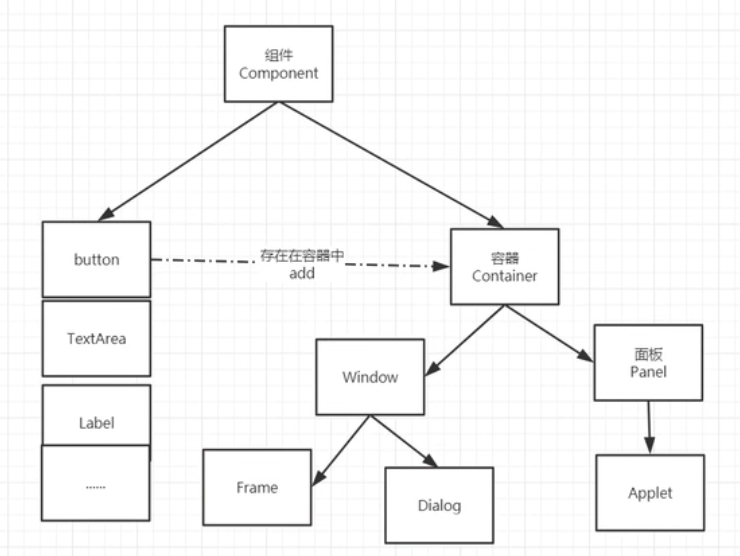
2.2 组件和容器
1. Frame
package com.teatea.lesson01;
import java.awt.*;
//GUI的第一个界面
public class TestFrame {
public static void main(String[] args) {
//Frame
Frame frame = new Frame("我的第一个Java图像界面窗口");
//需要设置可见性
frame.setVisible(true);
//设置窗口大小
frame.setSize(400,400);
//设置背景颜色
frame.setBackground(new Color(9,9,9));
//弹出位置
frame.setLocation(200,200);
//设置大小固定
frame.setResizable(false);
}
}
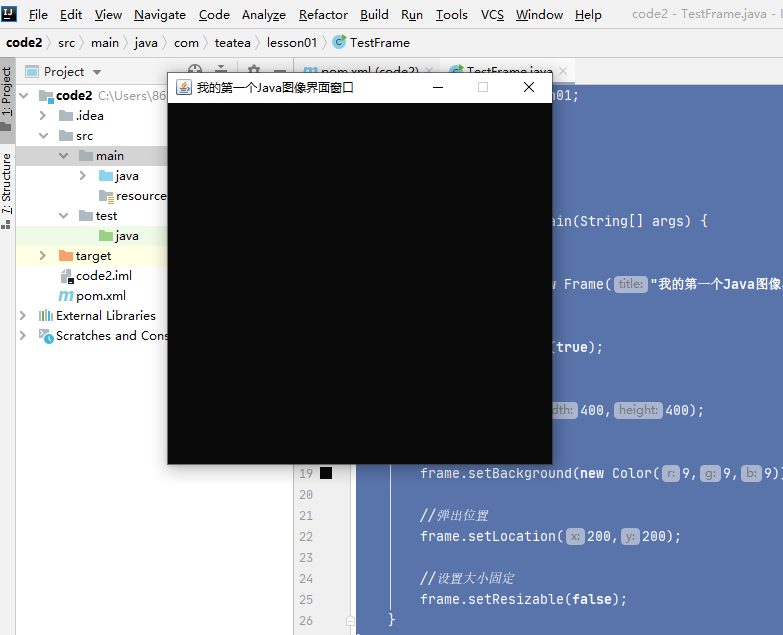
问题:窗口关不了,需要通过停止程序运行
=====================================================================
尝试回顾封装:
package com.teatea.lesson01;
import java.awt.*;
public class TestFrame2 {
public static void main(String[] args) {
//展示多个窗口 new
new MyFrame(100,100,200,200,Color.blue);
new MyFrame(300,100,200,200,Color.yellow);
new MyFrame(100,300,200,200,Color.red);
new MyFrame(300,300,200,200,Color.MAGENTA);
}
}
class MyFrame extends Frame{
static int id = 0; //可能存在多个窗口,我们需要一个计数器
public MyFrame(int x,int y,int w,int h,Color color){
super("MyFrame+"+(++id));
setBackground(color);
setBounds(x,y,w,h);
setVisible(true);
}
}
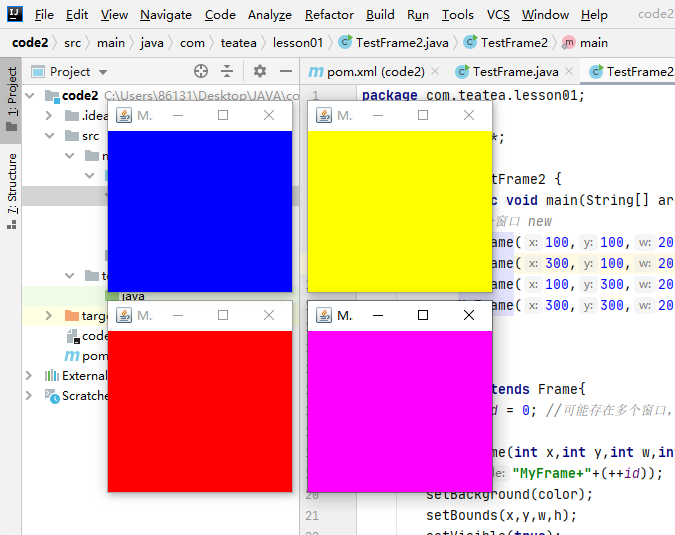
=====================================================================
2. 面板Panel
解决关闭窗口事件
package com.teatea.lesson01;
import java.awt.*;
import java.awt.event.WindowAdapter;
import java.awt.event.WindowEvent;
//Panel 可以看成一个空间,但是不可以单独存在
public class TestPanel {
public static void main(String[] args) {
Frame frame = new Frame();
Panel panel = new Panel();
//设置布局
frame.setLayout(null);
//坐标
frame.setBounds(300,300,500,500);
frame.setBackground(new Color(40,161,35));
//panel 设置坐标,相对于Frame
panel.setBounds(50,50,400,400);
panel.setBackground(new Color(193,15,60));
//frame.add(panel)
frame.add(panel);
frame.setVisible(true);
//监听事件,监听窗口关闭事件 System.exit()
frame.addWindowListener(new WindowAdapter() {
//窗口点击关闭的时候要做的事情
@Override
public void windowClosing(WindowEvent e) {
//结束程序
System.exit(0);
}
});
}
}
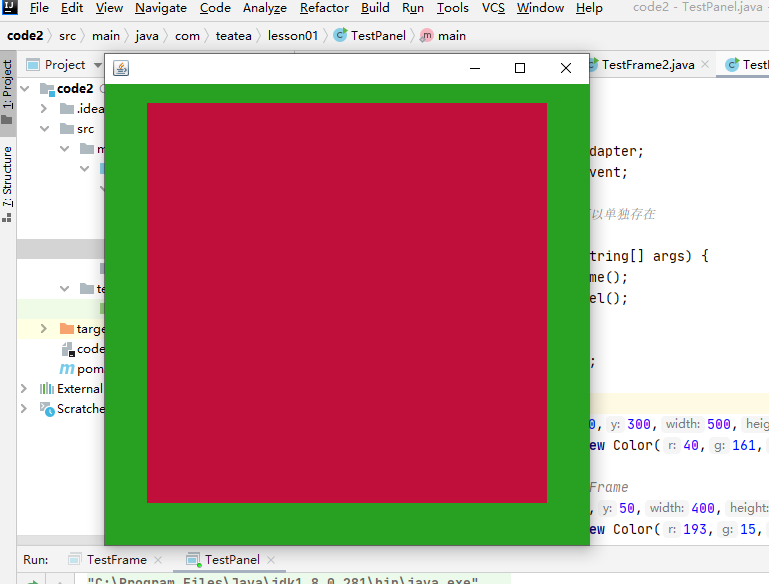
=====================================================================
3. 布局管理器
- 流式布局
package com.teatea.lesson01;
import java.awt.*;
public class TestFlowLayout {
public static void main(String[] args) {
Frame frame = new Frame();
//组件-按钮
Button button1 = new Button("button1");
Button button2 = new Button("button2");
Button button3 = new Button("button3");
//设置为流式布局
//frame.setLayout(new FlowLayout());
//frame.setLayout(new FlowLayout(FlowLayout.LEFT));
frame.setLayout(new FlowLayout(FlowLayout.RIGHT));
frame.setSize(200,200);
//按钮添加
frame.add(button1);
frame.add(button2);
frame.add(button3);
frame.setVisible(true);
}
}

- 东西南北中
package com.teatea.lesson01;
import java.awt.*;
public class TestBorderLayout {
public static void main(String[] args) {
Frame frame = new Frame("TestBorderLayout");
Button east = new Button("East");
Button west = new Button("West");
Button south = new Button("South");
Button north = new Button("North");
Button center = new Button("Center");
frame.add(east,BorderLayout.EAST);
frame.add(west,BorderLayout.WEST);
frame.add(south,BorderLayout.SOUTH);
frame.add(north,BorderLayout.NORTH);
frame.add(center,BorderLayout.CENTER);
frame.setSize(200,200);
frame.setVisible(true);
}
}

- 表格布局
package com.teatea.lesson01;
import java.awt.*;
public class TestGridLayout {
public static void main(String[] args) {
Frame frame = new Frame("TestGridLayout");
Button btn1 = new Button("btn1");
Button btn2 = new Button("btn2");
Button btn3 = new Button("btn3");
Button btn4 = new Button("btn4");
Button btn5 = new Button("btn5");
Button btn6 = new Button("btn6");
frame.setLayout(new GridLayout(3,2));
frame.add(btn1);
frame.add(btn2);
frame.add(btn3);
frame.add(btn4);
frame.add(btn5);
frame.add(btn6);
frame.pack(); //Java函数
frame.setVisible(true);
}
}
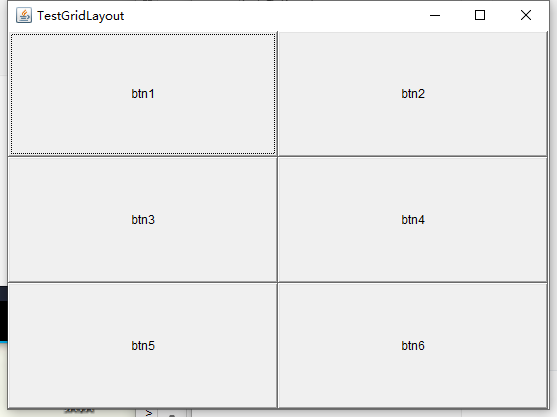
=====================================================================
思考题
写出图样式的button按钮布局
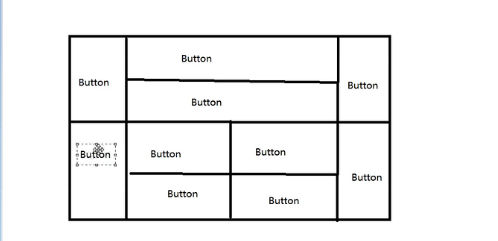
思路分析过程:

代码演示:
//未完待续package com.teatea.lesson01;
import java.awt.*;
import java.awt.event.WindowAdapter;
import java.awt.event.WindowEvent;
public class Test {
public static void main(String[] args) {
//总Frame
Frame frame = new Frame("Test");
frame.setSize(400,300);
frame.setLocation(900,400);
frame.setBackground(new Color(193,23,66));
frame.setVisible(true);
frame.setLayout(new GridLayout(2,1));
//4个面板
Panel panel1 = new Panel(new BorderLayout());
Panel panel2 = new Panel(new GridLayout(2,1));
Panel panel3 = new Panel(new BorderLayout());
Panel panel4 = new Panel(new GridLayout(2,2));
panel1.add(new Button("East-1"),BorderLayout.EAST);
panel1.add(new Button("West-1"),BorderLayout.WEST);
panel2.add(new Button("p2-btn-1"));
panel2.add(new Button("p2-btn-2"));
panel1.add(panel2,BorderLayout.CENTER);
//下面
panel3.add(new Button("East-2"),BorderLayout.EAST);
panel3.add(new Button("West-2"),BorderLayout.WEST);
//中间四个
for (int i = 0; i < 4; i++) {
panel4.add(new Button("p4-btn"+i));
}
panel3.add(panel4,BorderLayout.CENTER);
frame.add(panel1);
frame.add(panel3);
//监听事件,监听窗口关闭事件 System.exit()
frame.addWindowListener(new WindowAdapter() {
//窗口点击关闭的时候要做的事情
@Override
public void windowClosing(WindowEvent e) {
//结束程序
System.exit(0);
}
});
}
}
效果图:
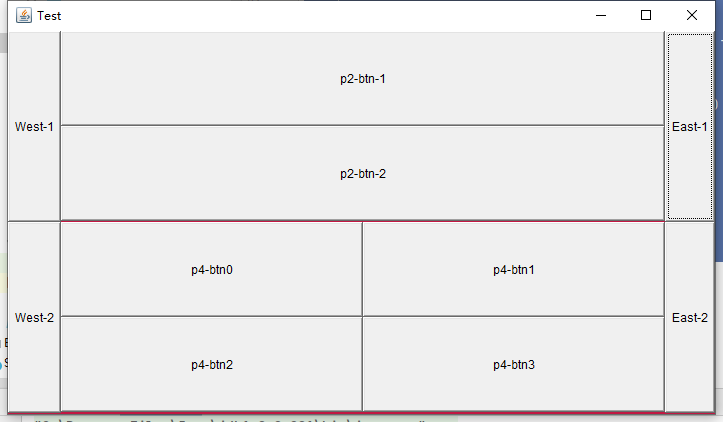
小结
- Frame是一个顶级窗口
- Panel不可以单独显示,必须添加到某个容器中
- 布局管理器
- 流式
- 东西南北中
- 表格
- 大小,定位,背景颜色,可见性,监听
=====================================================================
4. 事件监听
事件监听:当某个事情发生的时候,干什么?
package com.teatea.lesson02;
import java.awt.*;
import java.awt.event.ActionEvent;
import java.awt.event.ActionListener;
import java.awt.event.WindowAdapter;
import java.awt.event.WindowEvent;
public class TestActionEvent {
public static void main(String[] args) {
//按下按钮触发一些事件
Frame frame = new Frame();
Button button = new Button();
//因为addActionListener()需要一个ActionListener,所以需要我们构造
MyActionListener myActionListener = new MyActionListener();
button.addActionListener(myActionListener);
frame.add(button,BorderLayout.CENTER);
frame.pack(); //自适应
windowClose(frame); //关闭窗口
frame.setVisible(true);
}
//关闭窗体事件
private static void windowClose(Frame frame){
frame.addWindowListener(new WindowAdapter() {
@Override
public void windowClosing(WindowEvent e) {
System.exit(0);
}
});
}
}
class MyActionListener implements ActionListener{
@Override
public void actionPerformed(ActionEvent e) {
System.out.println("aaa");
}
}
多个按钮共享一个事件
package com.teatea.lesson02;
import java.awt.*;
import java.awt.event.ActionEvent;
import java.awt.event.ActionListener;
public class TestActionTwo {
public static void main(String[] args) {
//两个按钮,实现同一个监听
//开始 停止
Frame frame = new Frame("开始-停止");
Button button1 = new Button("start");
Button button2 = new Button("stop");
//可以显示的定义触发会返回的命令,如果不显式定义,则会显示默认的值!
//可以多个按钮只写一个监听类
button2.setActionCommand("button2-stop");
MyMonitor myMonitor = new MyMonitor();
button1.addActionListener(myMonitor);
button2.addActionListener(myMonitor);
frame.add(button1,BorderLayout.NORTH);
frame.add(button2,BorderLayout.SOUTH);
frame.pack();
frame.setVisible(true);
}
}
//写一个类就可以了
class MyMonitor implements ActionListener{
@Override
public void actionPerformed(ActionEvent e) {
//e.getActionCommond()获得按钮的信息
System.out.println("按钮被点击了:msg=>"+e.getActionCommand());
}
}
5. 输入框TextField监听
//跳过啦,有空再补充



 浙公网安备 33010602011771号
浙公网安备 33010602011771号